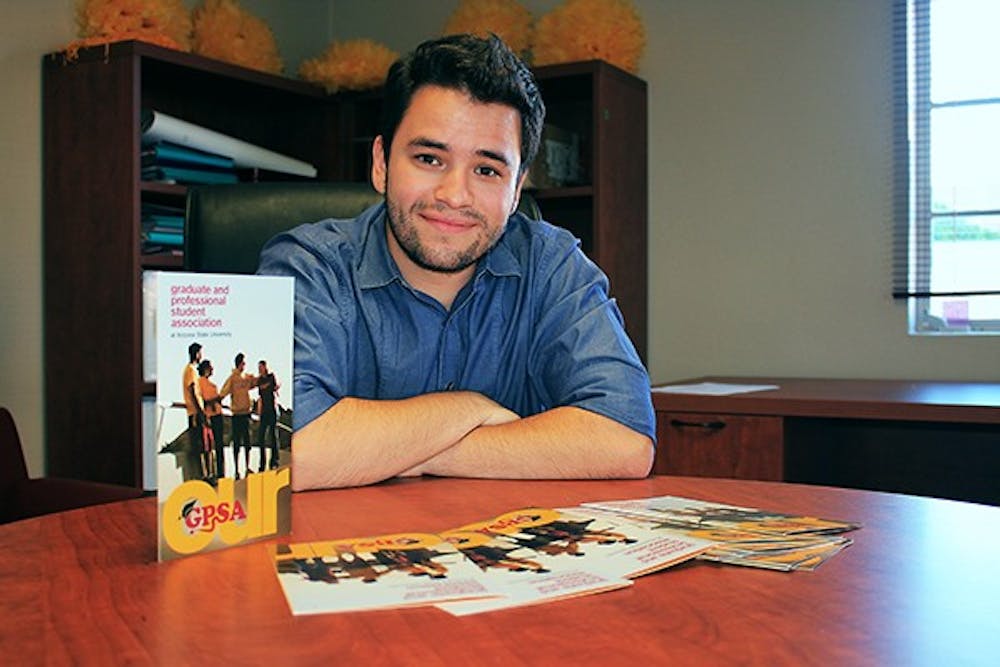 GPSA President German Cadenas poses at the Graduate Student Center, which also houses GPSA, on the Tempe campus on Monday, Sept. 22, 2014. (Shiva Balasubramanian/The State Press)
GPSA President German Cadenas poses at the Graduate Student Center, which also houses GPSA, on the Tempe campus on Monday, Sept. 22, 2014. (Shiva Balasubramanian/The State Press)
The lives of individuals who've received temporary legal status from recent federal actions are slowly getting easier following the U.S. Supreme Court's December decision not to support an Arizona order prohibiting them from receiving driver's licenses and identification cards.
But one area DREAMers — young immigrants who were brought illegally to the U.S. as children, still don't have proof of legal residency and have since gained or are working toward a high school diploma or GED — would still like to see change is the cost of tuition at state universities.
Arizona's universities don't consider DREAMers, even those who've received temporary legal status under the 2012 Deferred Action for Childhood Arrivals program, to be in-state residents for tuition purposes.
Along with traditional out-of-state students, undocumented students and deferred action recipients pay roughly $25,000 a year before living expenses.
Urban planning junior Enrique Gaxiola is a DREAMer. He spoke at the Arizona Board of Regents meeting in November and said he would like to see the price of tuition change.
“Out-of-state students come to ASU, and once they live here for a year, they can turn the tuition to in-state, and I think ... we should be able to have the opportunity to pay in-state tuition,” he said.
Gaxiola said something needs to be done with the rising cost of tuition and DREAMers need help receiving an education because of the high cost.
“Maybe we could create a separate category for deferred action students that is higher than in-state but lower than out-of-state but is affordable for someone working an entry-level job somewhere to be able to go to ASU,” he said.
Regent Dennis DeConcini proposed such a plan in November 2013, but the rest of the board didn't approve it.
With the cost of tuition for DREAMers being so high, even though they live in Arizona, the timeline to complete an undergraduate degree can be as long as eight or nine years, Gaxiola said.
Students from high schools and community colleges as well as the state universities spoke to ABOR about receiving an education as a DREAMer and the struggles they go through with tuition and other issues, said German Cadenas, president of the Graduate and Professional Student Association.
“There are DREAMers of many different ages who just want to get an education, and I think if they would lower the tuition for DREAMers to a tuition that is more fair, I think it’s going to be a positive thing not just for DREAMers but for the state of Arizona, because we will be able to educate more people that will help grow the economy,” Cadenas said.
ABOR listened but has not yet released any plans for changes.
As a former DREAMer and ASU alumnus and current ASU graduate student, Cadenas said he wanted the regents to hear the stories of DREAMers.
“I wanted them to hear our stories as DREAMers, because we consider ourselves Americans,” he said. “We believe in the same values and consider this home. We just want the chance to go to school.”
By telling the regents his success story, Cadenas said he hopes the board could see what the DREAMers bring to Arizona and what else they could do for the state with easier access to education.
“I was able to go to school and graduate and so on, and I wanted them to know that there are many students like me that want to get a degree and do something positive for the state like I did,” Cadenas said.
Dulce Matuz, co-founder and member of the Arizona DREAM Act Coalition and a 2009 ASU graduate, said she thinks it is unfair for DREAMers to have to pay out-of-state tuition since they are contributing to the state by paying taxes that fund public education and many have been living in Arizona for decades.
"I think it's unfair that DREAMers who have a legal presence and are authorized to be in the United States, and many of them have been in Arizona for decades and pay property taxes," she said. "So everyone is renting or has a home and public education is mainly funded by sales tax and property tax so they have been contributing to the state and if they meet the other criteria and are eligible they should be able to get into school."
DREAMers being treated fairly and being allowed to receive a college education at a fair rate will benefit the state with a highly educated and motivated workforce, Matuz said.
"I would urge ABOR to treat DREAMers equally and give them the opportunity to receive a higher education, and that starts with in-state tuition," she said.
Reach the reporter at jshanco2@asu.edu or follow @joey_hancock on Twitter
Like The State Press on Facebook and follow @statepress on Twitter




